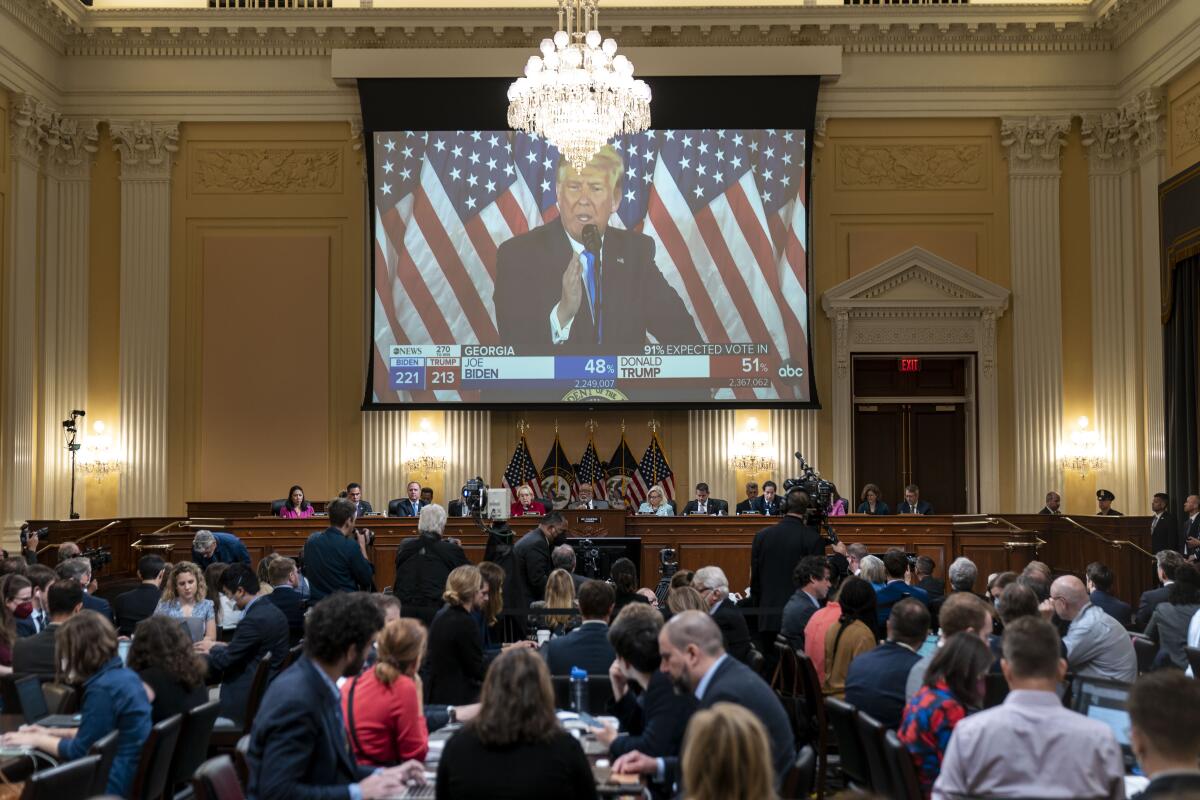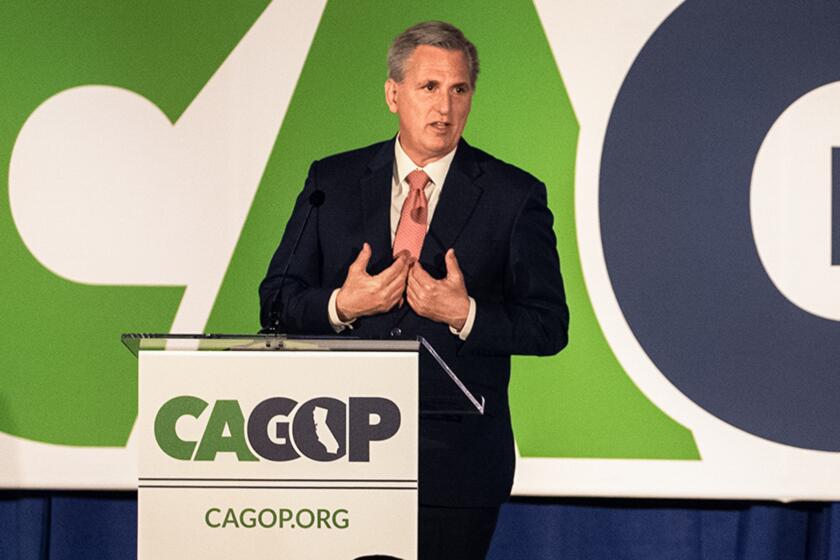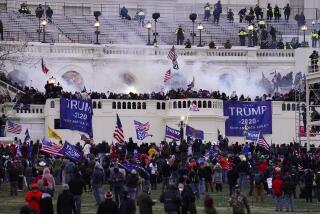Jan. 6 hearings have become Trump’s third impeachment — and a road map for prosecuting him

WASHINGTON — The House of Representatives launched its hearings on the Jan. 6 insurrection in the face of grimly low expectations.
Didn’t we already know what happened? After two impeachments and innumerable disclosures, was there anything new to learn about the misrule of Donald Trump?
The conventional wisdom turned out to be wrong.
Former President Trump, angry over the Jan. 6 hearings into election plotting, is blaming House Republican leader Kevin McCarthy for not getting GOP defenders on the panel.
The hearings have been informative, often gripping, sometimes dramatic. Former Trump aides have offered blunt assessments of their boss’ claims that the 2020 election was stolen. (“Bullshit,” in the concise judgment of former Atty. Gen. William Barr.)
Less prominent figures have described what it was like to become a target of the former president’s anger, like Ruby Freeman, the Georgia election worker whom Trump falsely denounced by name as “a professional vote scammer.”
“Do you know what it feels like to have the president of the United States target you?” the 62-year-old shop owner testified tearfully. “There is nowhere I feel safe.”
What has made the hearings an unexpected success isn’t, as some have suggested, Hollywood production values. They’re not all that slick.
The hearings have worked because they’re unusually well-organized — and, for Congress, refreshingly free of bloviation.
Each session has focused on one chapter in Trump’s sprawling plot: his bogus claims of fraud, his pressure on state officials to change the election results, his bullying of then-Vice President Mike Pence, all culminating in the riot he inspired on Jan. 6.
The basic facts have been familiar, but many of the details are new, especially the firsthand testimony from Republican officials.
It has added up to the equivalent of Trump’s third impeachment — this time, more damning than his first (in 2019, on Ukraine) or second (in 2021, immediately after the insurrection).
That wasn’t what the House committee intended — at least, not consciously.
“I don’t think that we conceived of this as another impeachment,” Rep. Adam B. Schiff (D-Burbank), a member of the committee who participated in the two earlier inquests, told me. “But it could have that impact.”
The word “impeach” originally means “to discredit,” Schiff noted.
“I would hope that what the public has seen in these hearings discredits and disqualifies Mr. Trump from ever holding office again,” he said.
In that sense, they’ve served as a kind of metaphorical impeachment.
The hearings have also served another purpose: They’ve shown the public a road map to the criminal charges Trump could face if Atty. Gen. Merrick Garland decides to prosecute him.
The committee and its leaders have have already cited at least three potential criminal offenses: inciting the riot on Jan. 6, obstructing a federal proceeding (by trying to block the count of the electoral vote), and conspiracy to defraud the United States (for example, by organizing bogus slates of “alternative electors”).
“President Trump had no factual basis for what he was doing, and he had been told it was illegal,” Rep. Liz Cheney (R-Wyo.), the committee’s vice chair, said in the hearings’ opening session.
Some Democrats have complained that Garland isn’t moving fast enough to prosecute the former president. They should be careful what they wish for; an indictment of Trump before the November congressional election could boost turnout among GOP voters.
In any case, there’s plenty of evidence that Justice Department investigators are already pulling on all these threads.
On June 6, a federal grand jury indicted five leaders of the right-wing Proud Boys militia on charges of seditious conspiracy.
In April, the Justice Department obtained subpoenas against Rudolph W. Giuliani and John Eastman, lawyers who advised Trump on his schemes.
Last week, its investigators served subpoenas on pro-Trump activists who organized the bogus “alternative elector” slates.
And they raided the Virginia home of Jeffrey Clark, a former Justice Department official who pushed for the department to endorse Trump’s claims of voter fraud.
The prosecutors don’t appear to need a road map from Congress, but the House hearings have given one — at least a rough version — to the rest of us.
“The biggest contribution of these hearings has been to make clear the personal culpability of Donald Trump,” Donald B. Ayer, who served as the No. 2 Justice Department official under President George H.W. Bush, told me.
“We already knew the overall outline of the case. But now we know Trump was the engine — the driving force.... We don’t know the whole case yet, but it’s gotten a heck of a lot stronger by virtue of these hearings.”
Legal scholars are already debating issues surrounding a possible prosecution: Can prosecutors persuade a jury to convict a former president? Will the side effects of prosecution outweigh the benefits?
Last week, Jack Goldsmith, who served in the Justice Department under President George W. Bush, warned that prosecuting a former president “would be a cataclysmic event from which the nation would not soon recover.”
Ayer disagrees. “The need for deterrence is really massive,” he argued. “We already know that Trump and his supporters are scheming to do this again.”
Both Ayer and Goldsmith, it should be noted, are Republicans who have long been critical of Trump.
Those are thorny issues that Garland will need to weigh. What the House hearings have made clear is that if he decides not to prosecute, it won’t be for lack of evidence.
More to Read
Get the L.A. Times Politics newsletter
Deeply reported insights into legislation, politics and policy from Sacramento, Washington and beyond. In your inbox three times per week.
You may occasionally receive promotional content from the Los Angeles Times.












